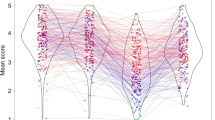Abstract
This study focused on complexity of the self-schema as one factor that influences people's responses to social feedback that challenges their established view of self. Complexity refers to the number of independent attributes included in the schema. A card-sorting task (Zajonc, 1960) was used to identify the high- and low-complexity groups. Subjects were given bogus feedback relevant to the targeted domain of self-knowledge, and changes in self-descriptiveness ratings and response latency times were monitored. Results suggest that high-complexity subjects were able to attend to and encode the disconfirming feedback, while low-complexity subjects responded by rejecting the feedback and reasserting positive aspects of the self. The implications of these findings for clarifying the process of self-schema updating, revision, and change are discussed.
Similar content being viewed by others
References
Ammons, R. B., & Ammons, C. H. (1962). The Quick Test: Provisional manual.Psychological Reports, 11, 111–116.
Bieri, J. (1955). Cognitive complexity-simplicity and predictive behavior.Journal of Abnormal Psychology, 51, 263–268.
Burleson, B. (1987). Cognitive complexity. In J. C. McCroskey & J. A. Daly (Eds.),Personality and interpersonal communication (pp. 305–349). New York: Sage
Crockett, W. (1965). Cognitive complexity and impression formation. In B. Maher (Ed.),Progress in experimental personality research (Vol. 2, pp. 47–90). New York: Academic Press.
Greenwald, A. G. (1980). The totalitarian ego fabrication and revision of personal history.American Psychologist, 35, 603–617.
Greenwald, A. G., & Pratkanis, A. R. (1984). The self. In R. S. Wyer & T. K. Srull (Eds.),Handbook of social cognition (Vol. 3, pp. 129–178). Hillsdale, NJ: Erlbaum.
Hastie, R. (1981). Schematic principles in human memory. In E. T. Higgins, C. P. Herman, & M. P. Zanna (Eds.),Social cognition: The Ontario Symposium (pp. 39–88). Hillsdale, NJ: Erlbaum.
Leventhal, H. (1957). Cognitive processes and interpersonal predictions.Journal of Abnormal and Social Psychology, 55, 176–180.
Lewicki, P. (1986).Nonconscious social information processing. New York: Academic Press.
Linville, P. (1982). Affective consequences of complexity regarding the self and others. In M. S. Clark & S. T. Fiske (Eds.),Affect and cognition (pp. 79–109). Hillsdale, NJ: Erlbaum.
Linville, P. (1985). Self-complexity and affective extremity: Don't put all your eggs in one cognitive basket.Social Cognition, 3, 94–120.
Linville, P. (1987). Self-complexity as a cognitive buffer against stress-related illness and depression.Journal of Personality and Social Psychology, 52, 663–676.
Linville, P., & Jones, E. (1980). Polarized appraisals of out-group members.Journal of Personality and Social Psychology, 38, 689–703.
Markus, H. (1977). Self-schemata and the processing of information about the self.Journal of Personality and Social Psychology, 35, 63–78.
Markus, H., & Sentis, K. (1982). The self in social information processing. In J. Suls (Ed.),Psychological perspectives on the self (Vol. 1, pp. 41–70). Hillsdale, NJ: Erlbaum.
Mayo, C., & Crockett, W. (1964). Cognitive complexity and primacy-recently effects in impression formation.Journal of Abnormal and Social Psychology, 68, 335–338.
Meltzer, B., Crockett, W., & Rosenkrantz, P. (1966). Cognitive complexity, value congruity, and the integration of potentially incompatible information in impressions of others.Journal of Personality and Social Psychology, 4, 338–343.
O'Keefe, D., & Sypher, H. (1981). Cognitive complexity and the relationship of cognitive complexity to communication.Human Communication Research, 8, 72–92.
Power, M. J., & Brewin, C. R. (1990). Self-esteem regulation in an emotional priming task.Cognition and Emotion, 4, 39–51.
Power, M. J., Brewin, C. R., Stuessy, A., & Mahony, T. (1991). The emotional priming task: Results from a student population.Cognitive Therapy and Research, 15, 21–31.
Rosenberg, M. (1965).Society and the adolescent self-image. Lawrenceville, NJ: Princeton University Press.
Scott, W., Osgood, D. W., & Peterson, C. (1979).Cognitive structure: Theory and measurement of individual difference. New York: John Wiley.
Swann, W. B., & Read, S. J. (1981). Self-verification processes: How we sustain our self-conceptions.Journal of Experimental Social Psychology, 17, 351–372.
Taylor, S. E., & Brown, J. D. (1988). Illusion and well-being: A social psychological perspective on mental health.Psychological Bulletin, 103, 193–210.
Taylor, S. E., & Crocker, J. (1981). Schematic bases of social information processing. In E. T. Higgins, C. P. Herman, & M. P. Zanna (Eds.),Social cognition: The Ontario Symposium (pp. 39–88). Hillsdale, NJ: Erlbaum.
Zajonc, R. B. (1954).Cognitive structure and cognitive tuning. Unpublished doctoral dissertation, University of Michigan, Ann Arbor.
Zajonc, R. B. (1960). The process of cognitive tuning in communication.Journal of Abnormal and Social Psychology, 61, 159–167.
Author information
Authors and Affiliations
Rights and permissions
About this article
Cite this article
Farchaus Stein, K. Complexity of the self-schema and responses to disconfirming feedback. Cogn Ther Res 18, 161–178 (1994). https://doi.org/10.1007/BF02357222
Issue Date:
DOI: https://doi.org/10.1007/BF02357222




